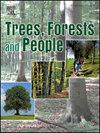SFI fiber sourcing certification associated with suspended sediment load reductions in Georgia, USA
IF 2.9
Q1 FORESTRY
引用次数: 0
Abstract
The Sustainable Forestry Initiative Fiber Sourcing Standard (SFI-FSS) is a market-based certification that promotes responsible forestry by requiring certified mills to procure wood only from trained loggers and suppliers who are implementing Best Management Practices (BMPs) across the supply chain. None of the previous studies have analyzed the association of the degree of SFI-FSS adoption with improved water quality. This study examines the impact of increased coverage of SFI-FSS certified mill sourcing areas (wood baskets) on suspended sediment concentration (SSC, mg/L) and sediment load (kg/ha/yr) in watersheds across Georgia, USA. Using a spatially explicit methodology, we analyzed data from 28 United States Geological Survey (USGS) monitoring stations, incorporating information on mill certification status, land cover (forest/crop), and hydrological discharge (cubic feet per second, cfs) over a 19-year period (2001–2019). A multiple linear regression model with area and time-fixed effects was used to assess the relationship between SFI-FSS mill presence and sediment load in watersheds overlapping the mill wood baskets. A 1 % increase in SFI-FSS certified mill sourcing area within a watershed is associated with a 3.5 kg/ha/yr reduction in median suspended sediment load (p < 0.01). This relationship indicates that increasing SFI-FSS certification coverage correlates with improved water quality by reducing sedimentation. Forest cover (%) also exhibited a significant inverse relationship with sediment load, reinforcing the well-documented role of forests in water filtration and sediment retention. These findings provide empirical support for the role of SFI-FSS certification programs in promoting water quality benefits. As certification programs continue to expand, their potential to contribute to sustainable watershed management should be further explored.
SFI纤维来源认证与美国乔治亚州悬浮泥沙负荷减少有关
可持续林业倡议纤维采购标准(SFI-FSS)是一项基于市场的认证,通过要求获得认证的工厂只向在整个供应链中实施最佳管理实践(bmp)的训练有素的伐木工人和供应商采购木材,促进负责任的林业。之前的研究都没有分析SFI-FSS采用程度与水质改善的关系。本研究考察了SFI-FSS认证的工厂采购区域(木筐)覆盖范围的增加对美国佐治亚州流域悬浮沉积物浓度(SSC, mg/L)和沉积物负荷(kg/ha/yr)的影响。使用空间明确的方法,我们分析了来自28个美国地质调查局(USGS)监测站的数据,包括19年(2001-2019)期间工厂认证状态、土地覆盖(森林/作物)和水文流量(立方英尺每秒,cfs)的信息。采用具有面积和时间固定效应的多元线性回归模型,评估了SFI-FSS磨厂存在与磨木篮重叠流域泥沙负荷之间的关系。在流域内,SFI-FSS认证的工厂采购面积每增加1%,中位悬浮泥沙负荷(p <;0.01)。这种关系表明,增加SFI-FSS认证覆盖率与通过减少沉积而改善水质相关。森林覆盖(%)也与泥沙负荷呈显著的负相关关系,这加强了森林在水过滤和泥沙滞留中的作用。这些发现为SFI-FSS认证计划在促进水质效益方面的作用提供了实证支持。随着认证项目的不断扩大,应进一步探索其促进可持续流域管理的潜力。
本文章由计算机程序翻译,如有差异,请以英文原文为准。
求助全文
约1分钟内获得全文
求助全文
来源期刊

Trees, Forests and People
Economics, Econometrics and Finance-Economics, Econometrics and Finance (miscellaneous)
CiteScore
4.30
自引率
7.40%
发文量
172
审稿时长
56 days
 求助内容:
求助内容: 应助结果提醒方式:
应助结果提醒方式:


